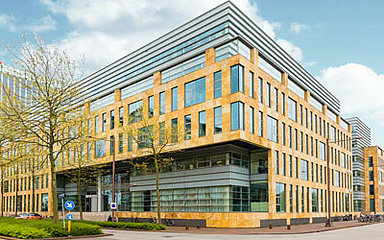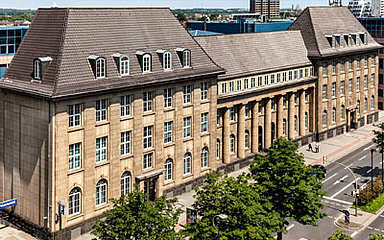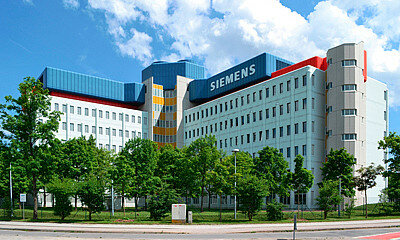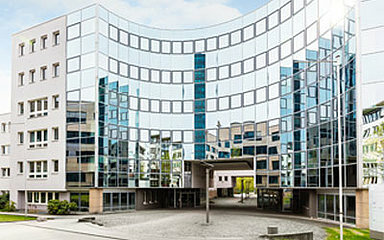Corporate Governance
The Group places a strong emphasis on corporate governance, executed responsibly by the Board of Directors and the management teams. The Group is proud of the high confidence of its investors, which is reflected in the impressive placement of funds by major global investment banks. Among AT’s shareholders and bondholders are the large international leading institutional investors and major global investment and sovereign funds.
Aroundtown follows very strict Code of Conducts which apply to its employees and business partners, and include policies for Anti- Bribery, Anti-Corruption, Anti-Discrimination, Conflict of Interest and others.
For more information, see the Sustainability Governance section of our website.
Aroundtown is not subject to any compulsory corporate governance code of conduct or respective statutory legal provisions and therefore not required to adhere to the “Ten Principles of Corporate Governance” of the Luxembourg Stock Exchange or to the German Corporate Governance Code, which are only applicable to domestic issuers. Nevertheless, Aroundtown already complies with most of the principles and continues to take steps to implement environmental, social and corporate governance best practices throughout its business. The Group’s efforts support the United Nations Sustainable Development Goals, particularly those relating to Peace, Justice and Strong Institutions (#16) and Partnerships for the Goals (#17).
Shareholders' rights
The Group respects the rights of all shareholders and ensures that they receive equal treatment. All shareholders have equal voting rights, and all corporate publications are transmitted through general publication channels as well as on a specific section on its website. The shareholders of Aroundtown SA exercise their voting rights at the AGM, whereby each share is granted one vote. The voting rights attached to shares held by TLG Immobilien AG in Aroundtown SA are suspended. The suspension of the voting rights also applies to shares held and/or acquired by Aroundtown SA, either directly or through subsidiaries, pursuant to its previously announced 2021/2022 buy-back program. The AGM of shareholders takes place at such place and time as specified in the notice of the meeting. At the AGM, the Board of Directors presents, among others, the directors‘ report as well as consolidated financial statements to the shareholders. The AGM resolves, among others, on the financial statements of the Group, the appointment of the approved independent auditor of the Group and the discharge to and appointment or re-election of the members of the Board of Directors, in case their mandate is about to expire.
Board of directors
The Board of Directors makes decisions solely in the Group’s best interest, independently of any conflict of interest. The Group is administered by a Board of Directors vested with the broadest powers to perform in the Group’s interests. All powers not expressly reserved by the Luxembourg Companies Act or by the articles of association to the general meeting of the shareholders fall within the competence of the Board of Directors.
On a regular basis, the Board of Directors evaluates the effective fulfilment of their remit and compliance with corporate governance procedures implemented by the Group. This evaluation is also performed by the Audit and Risk Committees. The Board of Directors currently consists of a total of seven members, of which four are independent and one is non-executive. The members are elected by the general meeting of shareholders and resolve matters on the basis of a simple majority, in accordance with the articles of association. The number of directors, their terms and the principles of their remuneration are determined by the general meeting of shareholders and the maximum term of directors’ appointment per election is six years according to Luxembourg law, however directors may be re-appointed after such term.
The Board of Directors is supported by five committees of the Board, these being the ESG, Audit, Risk, Remuneration and Nomination Committees. Additional support is provided by the Advisory Board. The Board of Directors is also provided with regular training on regulatory and legal updates, sector-specific and capital markets subjects and ESG matters.
Members of the Board of Directors
Senior and Key Management
Internal controls and risk management systems
The Group closely monitors and manages any potential risk and sets appropriate measures in order to mitigate the occurrence of any possible failure to a minimum. The risk management is led by the Risk Committee, which constructs the risk management structure, organization and processes, and coordinates risk-related training. The Risk Committee monitors the effectiveness of risk management functions throughout the organization, ensures that infrastructure, resources and systems are in place for risk management and are adequate to maintain a satisfactory level of risk management discipline. The Group categorizes the risk management systems into two main categories: internal risk mitigation and external risk mitigation.
The internal controls and compliance of the Group is supervised by Mr. Christian Hupfer, the CCO (Chief Compliance Officer) of the Group.




